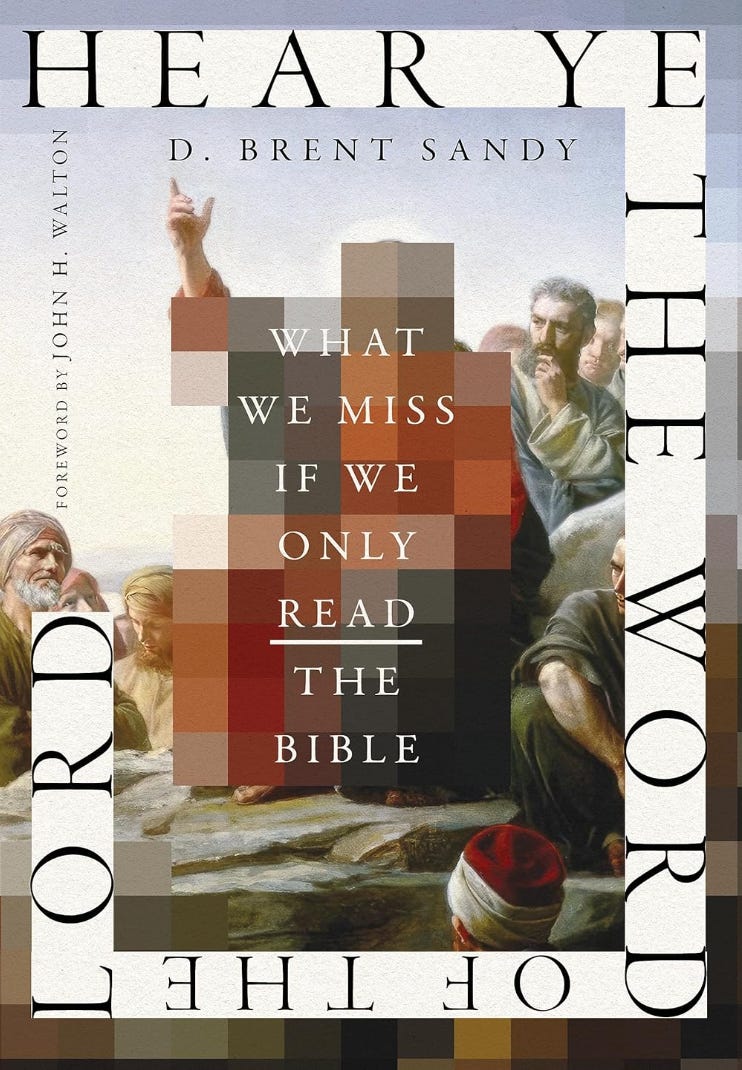Though Christianity has been fashioned and described over and over as a “religion of the book,” in the beginning of Christianity there was no book. In the beginning what was the gospel. (By the way, that last sentence was the original title of my book, The King Jesus Gospel.) The gospel, the story about Jesus, anchored and flowing out of the story of Israel, formed the beginning and shaped the entire future of the Christian faith. Put differently, it was not writing but speaking that formed the Christian faith.
Which is why the new book, Hear Ye the Word of the Lord, by D. Brent Sandy, deserves to be read carefully and pondered by all interpreters of scripture.
When I was teaching undergraduate students I used his book on the prophets – Plowshares and Pruning Hooks. Students read it, learned from it, and the book gave them categories to read the prophets. Sandy’s newest book will do the same for those who want to understand the oral basis of Christian scriptures.
John Walton says, “if we want to receive the message of God, we need to be on the same wavelength with it – like tuning into the right frequency on a radio.” One of those frequencies is the nature of Scripture as originally an oral presentation. “In this book, we become aware of yet another gap that we must recognize and factor into our reading: we must bridge the modality gap between the written word and the oral word.” He continues with “we often study the Bible with an assumption that its books are the result of someone sitting down with blank parchment and scrawling out inspired thoughts. Perhaps a few of the books of the Bible could have come about in such a way, but generally the books of the Bible are the end result of a long process in which the written form, the book, is the last step rather than the first.” More: “in the process we learned more about the importance of community as groups hearing the word of God. Relationships mattered more; Body language, inflection, and intonation supply the emotional setting; context provides guides to relevance that drew meaning into the minds of the hearers. Community hearing was experiential.”
Here's a big one: “an oral performance is an event, while a literary text is an artifact.” Reading scriptures aloud can re-live that event.
Sandy has chosen to organize his book in the style of John Walton, and thus he has 18 propositions, each of which being a concise chapter. I want to provide those for the Substack today.
Setting the stage
1. Oral culture can be a lost world
2. God reached across great distances – so must we
3. Divine revelation was intended for hearers
4. Research provides important insights into ancient oral culture
5. The goal is to include their hearing in our reading
God and his agents of oral communication
6. Scripture presents God as the ultimate oral communicator
7. God spoke divine truth to and through Moses
8. God spoke divine truth to and through the prophets
9. God spoke divine truth to and through Jesus
10. Jesus empowered his followers to proclaim the gospel as he did
11. Jesus's followers faithfully remembered and communicated the oral gospel
Implications of oral scripture
12. Stories were performed and heard in ancient oral culture
13. We can become better hearers and speakers of scripture
14. We can restore oral scripture to its rightful place
Experiments in oral interpretation
15. Hearing is more than reading: understanding scripture holistically
16. Hearing is more than reading: imagining creation and incarnation
17. Hearing is more than reading: experiencing Jesus' return to Nazareth
18. Hearing is more than reading: rethinking the vine and the branches
The oral tradition and the importance of public speaking have become important to seminary students these days. Two of my current thesis students are working on ancient reading and on the importance of reading aloud to help churches learn better how to read the Bible.
Please join me as we work through this book in a series of posts.






Scot, thanks for this recommendation, I look forward to reading it! I have been performing the book of Romans (unabridged) for the past 5 years as a stage play with multiple actors; the process has been transformative. The performance has become an exegetical tool and has opened up the rhetoric of Paul's most famous letter to me. Highly recommend.
It’s exciting to see more sharing of the good news of the oral tradition of scripture. I was blessed to study under Tom Boomershine, at seminary during the mid ‘90’s. Hearing “The Stories of scripture being told is a wonderful experience. It’s also quite another experience to study and learn a story to tell. Thanks!